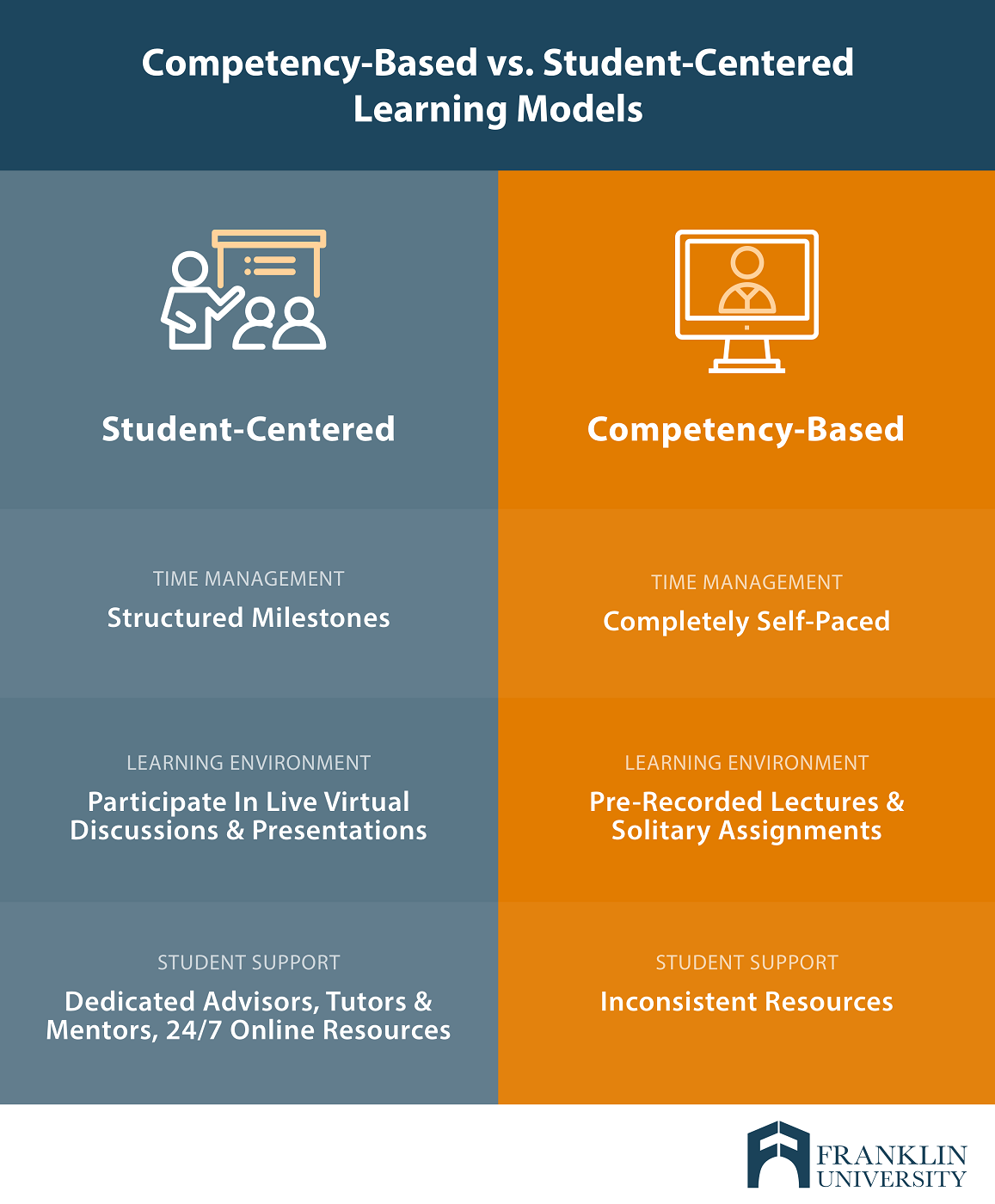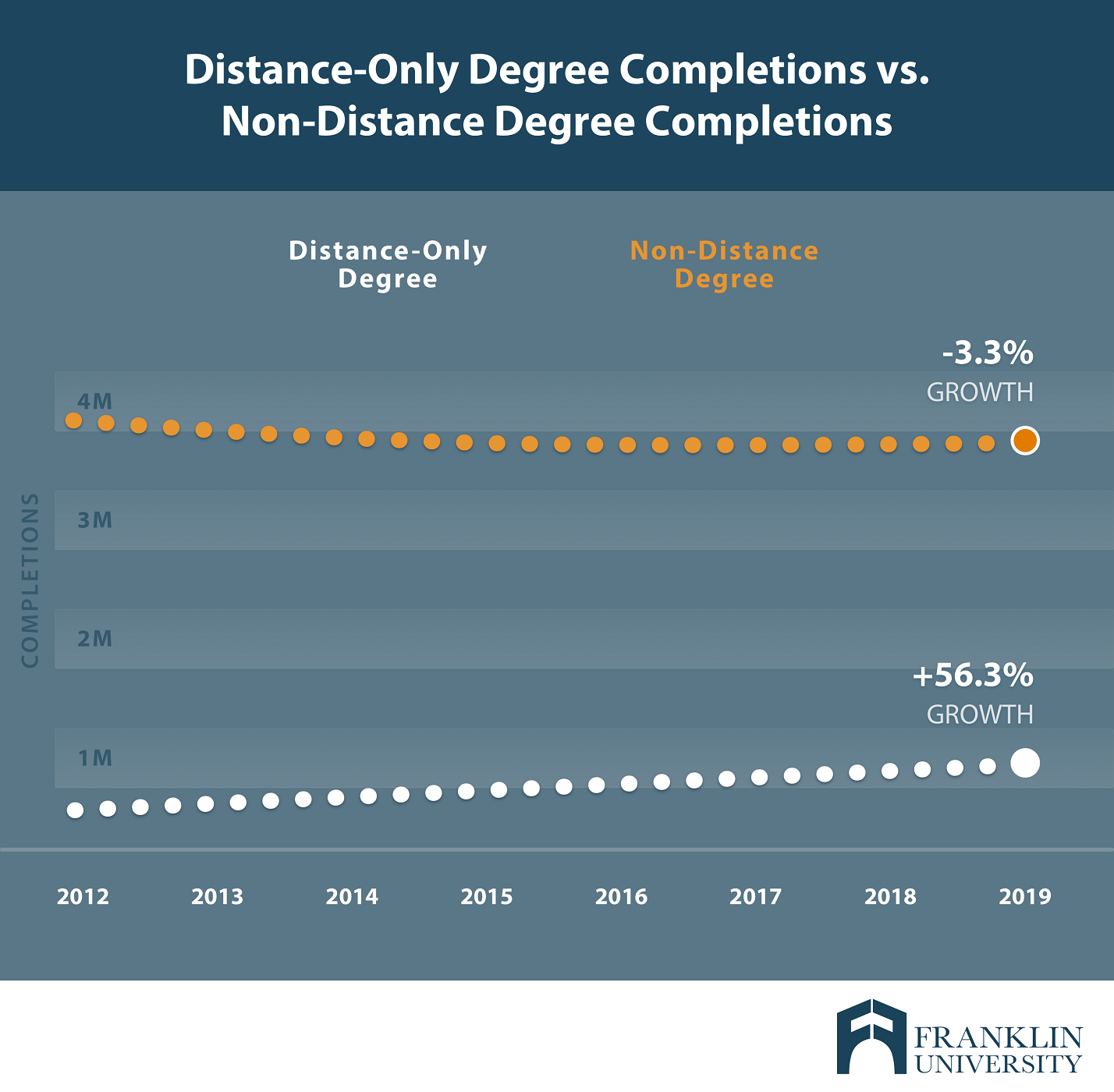Request Information
We're Sorry
There was an unexpected error with the form (your web browser was unable to retrieve some required data from our servers). This kind of error may occur if you have temporarily lost your internet connection. If you're able to verify that your internet connection is stable and the error persists, the Franklin University Help Desk is available to assist you at helpdesk@franklin.edu, 614.947.6682 (local), or 1.866.435.7006 (toll free).
Just a moment while we process your submission.

Is Online College Worth It?
The value of online college is top-of-mind for many students looking to earn their degree. COVID-19 has colleges of all shapes and sizes prioritizing online learning formats. Because of this dramatic and rapid shift, there’s a clear distinction you need to make when considering the worth of online college.
It's also worth noting that an online college and a college adapting to conduct classes online are vastly different.
A true online college designs curriculum, learning experiences and evaluation to be conducted virtually. They employ instructional designers and do rigorous testing on the best ways to teach content to improve student success. On the other hand, a traditional college that simply migrates their in-person courses online may fall short of student expectations.
Even if you’re comparing online colleges that have a long history of teaching virtually, there can be a world of difference. From nonprofit to for-profit online universities to online-only models and hybrid offerings, there are many factors to consider when determining the worth of an online education.
Determining If An Online College Is Legitimate
The days of associating a stigma with online education are long gone. Online degrees continue to rise in prominence and popularity. According to labor analytics firm EMSI, in 2019, 1,358,068 degrees were completed online, accounting for 26% of all college degrees that year. From 2012 to 2019, completions of traditional, non-distanced offered degrees have declined by 3.3%. While these traditional universities are struggling to attract students, online colleges are thriving—experiencing a 56.3% increase in degree completions over the same time period.
But that doesn't mean all online colleges are worth it.
How do you separate the online colleges that are worth the investment from the ones that aren’t? Get answers to these 6 key questions to holistically measure the worth of an online college:
- Is this online college regionally accredited?
- Does this online college offer tailored support services and resources to enable my success?
- Does this online college provide an engaging, interactive and hands-on learning environment?
- Will I gain both technical and soft skills that will set me apart for advancement?
- Will a degree from this online college be respected by employers?
- Will my short-term and long-term earning and hiring potential improve with this online degree?
Once you determine the legitimacy and value of an online college, you can reap the benefits of earning your degree online.
8 Clear Advantages of Online College
Attending an online college is a choice in the way you learn—not the degree you earn. There is no such thing as an “online degree.” You earn the same bachelor’s, master’s or doctorate credential online as you would through an on-campus program.
Heading back to school? Make sure you max out your Financial Aid with the help of this free FAFSA report.
If you choose the right online college, the quality of your education and learning experience should be the same—if not better—than getting your degree at a traditional college. The advantages to earning your degree online only multiply if you’re a working professional.
Let’s look at 8 ways online college can benefit you:
- The opportunity cost of your degree is less because you can continue to earn income while pursuing your degree (plus tuition and fees can be lower than on-campus programs).
- You experience the incremental worth of a degree, as you can apply the skills you learn to your day-to-day job from day one. It’s not uncommon for professionals to be promoted before they complete their online degree program.
- Online collaboration and presentation skills are embedded into an online degree, preparing you to use the tools demanded by an increasingly virtual business landscape.
- You get the benefit of a more flexible academic calendar and course scheduling, making it easier to earn your degree at your own pace and around your schedule.
- Online course content is geared toward real-world application, not just academic theory.
- The learning environment is more diverse—professionals from different backgrounds, experience levels and geographic locations add unique perspectives to course content.
- You save time and money by eliminating a commute to campus, time which can be put toward your academic, professional or personal pursuits.
- Online courses are standardized around defined learning outcomes, rather than being completely reliant on an individual professor to develop course content.
4 Possible Disadvantages of Online College
Online college can also have its drawbacks—especially if you don’t do your homework on which online college to attend. There are many low-quality internet or for-profit colleges that provide little to no long-term value. Online colleges may also have radically different teaching and learning philosophies. Be aware of these pitfalls:
- Beware of online college scams. Illegitimate online colleges can create a convincing facade. Don’t get fooled—do your research into accreditation, graduation rates and student reviews before committing to any school.
- Time management can be challenging. Some online colleges, especially ones that use a competency-based approach, lack structure and deadlines for completing coursework. If you thrive in a structured and predictable learning environment, make sure you choose an online college that emphasizes a balanced learning approach. This approach ensures that you complete approximately the same amount of work each week of the course, making it easier to schedule around your other priorities.
- Your learning environment may lead to feeling isolated. Competency-based online courses are completed completely at your own pace. This may sound like a benefit, but it also means you trade off the benefits of a collaborative and interactive learning environment. An instructor-led and student-centered online college emphasizes 360-degree learning where working together is essential. The best programs will maintain flexibility by recording lectures and tailoring assignments if scheduling conflicts arise for you.
- Student support systems vary widely. Some online colleges lack personal support. If you choose a competency-based online program, you may have less access to instructors, advisors and peers. You may only receive support if you’re struggling in a course. The best, student-centered online colleges will create dedicated resources to help students—whether they are struggling or not. Personal academic advisors, active and engaged instructors and 24/7 resources like online libraries can make a huge difference in successfully earning your degree.
You need to make sure that the learning experience at an online college meets both your needs and expectations as a student. Go into your search for an online degree with your eyes open to the disadvantages an online college may present.
An Additional Word About Models of Online Education
There are two competing models for online learning—student-centered and competency-based.
Student-centered online learning focuses on outcomes to meet the evolving needs of students and employers. Student-centered courses balance autonomy with structured student support. Expect defined course timelines, instructor-led classes and collaborative assignments.
Competency-based online education, on the other hand, is a predominantly solitary learning experience. You set the pace for your learning, only moving to the next course after proving your expertise in a topic. Expect a linear learning experience, limited interaction with instructors and courses without deadlines.

Online College is Worth It—When You Choose The Right One
Finding a high-quality online college is only the first step. You need to find an online college that meets your individual needs as a student to make it worth it. Make sure you research the programs offered by each online college and ensure the degree and curriculum are relevant to your career goals.
Franklin University is an adult-focused and student-centered online college. We understand the needs of working professionals and provide the flexibility, industry-relevant degrees and support services that fuel success. Our approach to online college will provide a high-quality degree that puts you on the path to advancement.
Learn more about Franklin University and what makes it a great choice for earning your degree online.






